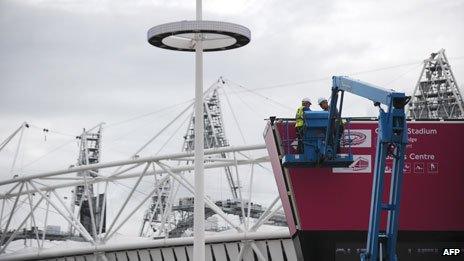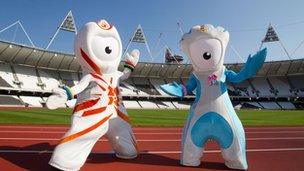Paralympics: Park changes look ahead of Games
- Published

Workers alter a sign on the Olympic Park
Just five days after the last Olympic athletes departed, the first Paralympic Games officials are arriving at the Athletes' Village on the Olympic Park in east London.
There are 16 days between the Olympic Games closing ceremony and the opening of the Paralympic Games and workers have been busy making changes to the Park.
Banners and signage are being changed, buses are being converted and new volunteers are being trained as only a third of those who helped to run the Olympics are moving on to the Paralympics.
London 2012 architects Populous integrated Paralympic thinking into their plans from the start of the London 2012 project. The Athletes' Village and the stadia were all designed with the Olympics and Paralympics in mind.
The Park was built with accessible toilets, ramps and wheelchair spaces in the main venues.
The Athletes' Village housed 11,000 competitors during the Olympics and its lower floors will be used by 4,200 Paralympians from 165 nations, with rooms fitted out to cater for wheelchair access for wheelchair-using athletes. Athletes begin arriving there on Wednesday.
"All of the venues were designed to be inclusive and accessible, which has meant a minimal transition in the two weeks between the Olympic and Paralympic Games, other than the changes to fields of play," Chris Jopson, associate principal at London 2012 architects Populous, told the BBC.
Some changes have been made however - for example about 300 buses have been converted to allow space for five or six wheelchairs.
Venues have increased their wheelchair seating capacity. The Olympic Stadium will have 568 spaces compared with 394 during the Olympics.

The Paralympics may look different, but organisers are hoping they will feel as electric as the Olympics
Sixteen venues - including the BMX circuit, the Water Polo Arena, Horse Guards Parade, Lee Valley, Hadleigh Farm, Wembley and six football stadiums - will not be used during the Paralympics.
Others will host different sports. The Copper Box, which staged handball and some modern pentathlon events at the Olympics, will be the venue for goalball.
The seven-a-side football competition will be played on the distinctive pink and blue surface of the Riverbank Arena which hosted the Olympics hockey competition.
Populous are also building a 3,000 seat five-a-side football venue on the Olympic hockey warm-up pitch.
There are new venues too.
Brands Hatch in Kent will be used for road cycling events while a specialist tennis venue has been created inside the Olympic Park. Eton Manor has four indoor and six outdoor wheelchair tennis courts, all designed in a striking blue.
Mr Jopson said: "It's a different Games with a different brand, and there's a been a big programme to change the look of the Park."
Venues and 2,000 fleet vehicles have been decorated with the Paralympic Agitos - red, green and blue swoops representing the Paralympic motto "spirit in motion" - which will also replace the giant Olympic rings on Tower Bridge and in Trafalgar Square.
So the Paralympic Games will look different, but from the success of ticket sales they might feel very much the same as the Olympics.
Previously, Paralympians have performed in front of half-empty crowds. With 2.2 million out of 2.5 million Paralympics tickets having sold so far, that will not be the case next week.
The Paralympic Games run from 29 August to 9 September.
- Published16 August 2012
- Published15 August 2012
- Published14 August 2012